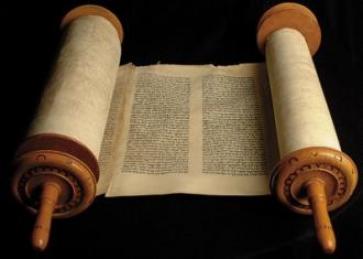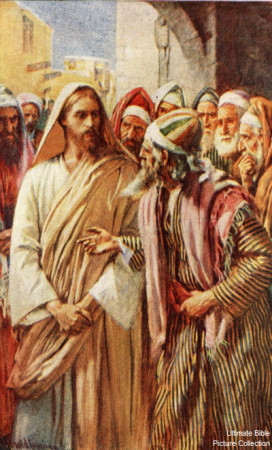In Matthew 22:23-33,we hear:
That same day the Sadducees, who say there is no resurrection, came to him with a question. “Teacher,” they said, “Moses told us that if a man dies without having children, his brother must marry the widow and have children for him. Now there were seven brothers among us. The first one married and died, and since he had no children, he left his wife to his brother. The same thing happened to the second and third brother, right on down to the seventh. Finally, the woman died. Now then, at the resurrection, whose wife will she be of the seven, since all of them were married to her?”
Jesus replied, “You are in error because you do not know the Scriptures or the power of God. At the resurrection people will neither marry nor be given in marriage; they will be like the angels in heaven. But about the resurrection of the dead—have you not read what God said to you, ‘I am the God of Abraham, the God of Isaac, and the God of Jacob’? He is not the God of the dead but of the living.”
When the crowds heard this, they were astonished at his teaching.
What’s striking is that Jesus uses such a strange passage to support this doctrine — Exodus 3:6. The reason He does this is that the Sadducees accepted only the first five Books of the Bible, the Torah, also known as the Law of Moses.
We can know this from a number of early Church Fathers. St. Hippolytus of Rome (170-235 A.D.) said that the Sadducees “do not, however, devote attention to prophets, but neither do they to any other sages, except to the law of Moses only, in regard of which, however, they frame no interpretations.”
Likewise, Origen (184-253) said that “although the Samaritans and Sadducees, who receive the books of Moses alone, would say that there were contained in them predictions regarding Christ, yet certainly not in Jerusalem, which is not even mentioned in the times of Moses, was the prophecy uttered.”
And that interpretation, of course, makes sense. If the Sadducees believed that the rest of the Old Testament was inspired, Jesus could have pointed to verses laying out the Resurrection in explicit terms. Instead, He proves it in a somewhat roundabout way by relying upon Exodus 3:6, which is certainly less than explicit. Doesn’t that strike you as at least a bit odd? And I’m not just reading that into this passage. Jerome (347-420) explicitly tells us that He used this passage because of the Saduccees’ rejection of the rest of the Bible:
“In proof of the resurrection there were many plainer passages which He might have cited; among others that of Isaiah, ‘The dead shall be raised; they that are in the tombs shall rise again’ [Isa 26:29, Septuagint]: and in another place, ‘Many of them that sleep in the dust of the earth shall awake’ [Dan. 12:2].
It is enquired therefore why the Lord should have chosen this testimony which seems ambiguous, and not sufficiently belonging to the truth of the resurrection; and as if by this He had proved the point adds, ‘He is not the God of the dead, but of the living.’
We have said above that the Sadducees confessed neither Angel, nor spirit, nor resurrection of the body, and taught also the death of the soul. But they also received only the five books of Moses, rejecting the Prophets. It would have been foolish therefore to have brought forward testimonies whose authority they did not admit.”
So whether you look to Scripture or the Fathers, you can see that the Sadducees used only a Five-Book Canon, the Law of Moses.
Rather than correcting them on this issue, Jesus recognizes that the Scriptures (no matter how complete or incomplete) are meant as an instrument to draw us nearer to God. The fact that the Sadducees were missing out on a lot of Scripture was a problem. The fact that they ignore the Scriptures they have is a bigger problem. When Jesus says to them, “you are in error because you do not know the Scriptures or the power of God,” He’s not complaining that they don’t have the Book of Daniel, but that they don’t read the Book of Exodus, which they do have. Likewise, we Catholics, who have been graced with the full Scriptures, will face a much worse judgment if we ignore them then will Protestants who remained innocently ignorant that there was more of the word of God out there.



enter my name here as one who needs a more comprehensive knowledge and understanding of Scripture…
God Bless
Cary
The Sadducees did study the Five-Book Canon intensely. If they could not get it right what chance do we have with a 66 or 73 book cannon?
Cary, amen! Sign me up, too.
Randy,
You’re right. If we were left with “Scripture alone,” neither 66 Books nor 73 Books would keep us out of error. But Christ gave us His Church (1 Timothy 3:15), His perpetual assistance (Matthew 28:20), and the constant guidance of the Holy Spirit (John 14:16-17, 14:26). The factionalism of the Jews should have been (and should be) a warning to those who would ignore the Church.
In Christ,
Joe
Josephus writes in Book 18 of Antiquities:
“But the doctrine of the Sadducees is this: That souls die with the bodies; nor do they regard the observation of any thing besides what the law enjoins them…”
Hey Joe,
I’ve recently heard it asserted that Josephus said that the canon was agreed upon and universal, with Against Apion 1:8 submitted as proof.
Josephus wrote this work after the Fall of Jerusalem and the effective eradication of the Sadducees, so I guess that is one consideration.
I guess another is that Josephus was writing a polemical work in defense of Judaism against the Greeks, so I would guess he would want to put forward the most united vision of Judaism.
Thoughts?
David,
There’s no question that Josephus used the modern Protestant Old Testament canon. But he’s also a Pharisee from Jerusalem, so that’s exactly what we’d expect.
I don’t think Josephus literally meant that no Jews held a different canon of Scripture. But assume that he does. One might just as easily find modern writers today claiming (or assuming) that all Christians use the same Sixty-Six Books of the Protestant Bible. We would rightly view this either as (a) historical ignorance, because the writer is not well-acquainted with any non-Protestant Christians, or (b) a polemic, rendered false by contradictory evidence.
So I would say that Josephus is accurately describing the Jerusalem Pharisee’s canon (which is what he was), and is either ignoring or is ignorant of all competing canons. Given that, as you suggested, these competing canons were in the decline by the time he’s writing, that’s not particularly unusual. After all, how often do we hear about the Ethiopian Orthodox canon?
So Josephus’ testimony is helpful, but not if it’s used to the exclusion of all other historical evidence.
God bless,
Joe
What about the Essenes? Didn’t they use a different canon? This is really the only decent response I’ve heard from a Protestant. That is, how could Jesus hold people responsible for adhering to a Scripture verse back then if the Jews didn’t have an infallible Magesterium to tell the OT Jew what Scripture was?
The very idea of canon before the 2nd century AD was a foreign one. They viewed books in terms of authoritative, but had not yet assembled an “authoritative collection of books” (Metzger, Canon of the NT, 282). As scholar Eugene Ulrich says, “There is, to my knowledge, no evidence prior to the late first century CE, either in Judaism or Christianity, to suggest that there was either a fixed list of books, or a fixed text of either individual books or, a fortiori, a unified collection of books. Thus, prior to the end of the first century, we do not have a canon in either Judaism or Christianity” (The DSS and the Origins of the Bible, 59).
With that said, it does look as if the Essenes (specifically the Qumran community) indeed held to a few other books as being authoritative and divinely ‘inspired’ (itself an anachronism the same as ‘canon’), namely the Temple Scroll and Jubilees, and perhaps the first 50 chapters or so (memory escapes me) of 1 Enoch. But all this to say that we can’t exactly say that they ‘used a different canon,’ but it appears their view of authoritative, inspired works went beyond what was later codified.
To your resulting question, Jesus could hold people responsible for adhering to a scripture verse back then when it came from a section that they ALL recognized as ‘canonical’ (still anachronistic) or ‘authoritative.’ The Essenes, Pharisees, and Sadducees, along with the Samaritans (who held to their own Samaritan Pentateuch) would have all recognized Ex. as the Word of God, and thus, Jesus was right in pointing to this verse as authoritative and binding upon all.